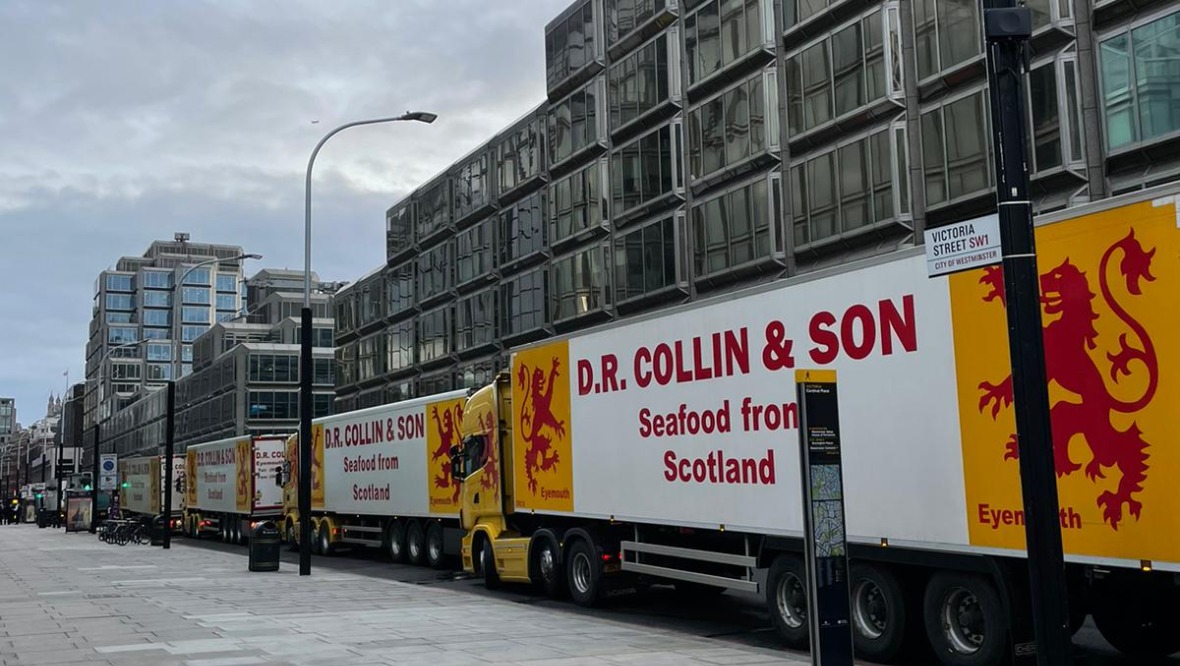Dozens of shellfish lorries from Scotland’s coastal communities have descended on central London to highlight the export problems they have faced due to Brexit.
The lorries parked on roads near 10 Downing Street and the Palace of Westminster on Monday morning.
Exports of fresh fish and seafood have been severely disrupted by delays since the UK’s transition period ended on December 31.
Scottish seafood firms say they are suffering major delays in exporting their produce to Europe as red tape and logistical issues continue to hamper post-Brexit trading arrangements.
Since the New Year, dozens of lorries have been held up by bureaucracy in Scotland and France, leading to waste in the stocks of fresh fish.
Alasdair Hughson, chairman of the Scottish Creel Fishermen’s Federation, said it was inevitable the industry “would want to make its voice heard loud and clear on this matter”.
He said: “If this debacle does not improve very soon we are looking at many established businesses coming to the end of the line.
“With the knock-on effects for all who depend on them – including the hundreds of small fishing businesses in extremely fragile communities around our coasts who rely on these trucks to turn up day-after-day, week-after-week to get their catch to market, from seabed-to-plate – this is not an easy business.
“People put their heart and soul into making it work, with ridiculously long hours – blood, sweat and tears are poured into their operations.
“What else can they do but fight to make their voices heard. We need government and civil service to step up to the plate like never before and do whatever they can to help this industry survive.
“All we want to do is roll up our sleeves and get to work supporting our communities. We don’t have all the answers but they are out there and we need to find them.”
Earlier this month, dozens of Scottish lorries were held up in queues at Larkhall and Dunkirk, northern France, over IT problems and customs barcodes.
The Scottish Seafood Association, which represents processors, has warned the problem is likely to get worse as the pace of trade increases.
In a further blow, the transport company that deals with the movement of most Scottish seafood products – Danish shipping firm DFDS – temporarily cancelled its groupage export services.
The service, which deals with goods dispatched by several different companies into the same load, had been suspended since January 8 but has now resumed.
It means exporters were unable to obtain the necessary paperwork before lorries laden with fresh seafood could travel to DFDS’ warehouse in Larkhall, South Lanarkshire, where batches of seafood are consolidated into truckloads for onward travel to English Channel ports and then transported to northern France.
Some Scottish fishermen have been landing their catch in Denmark to avoid the “bureaucratic system” that exports to Europe now involve, according to Scotland’s Rural Economy Secretary Fergus Ewing.
Foreign secretary Dominic Raab claimed on Monday that delays to fishing exports are just “teething problems”.
But a spokesperson from DR Collin & Son, who were taking part in the London protest, said the seafood industry had been “tied in knots with paperwork requirements”.
The spokesperson said: “These are not ‘teething issues’ as reported by the Government and the consequences of these problems will be catastrophic on the lives of fishermen, fishing towns and the shellfish industry as a whole.
“The industry is being tied in knots with paperwork requirements which would be easy enough to navigate, given that companies have put in the time and training in order to have all the relevant procedures in place for 1st January 2021.
“However, all the training is going to waste as the technology is outdated and cannot cope with the demands being placed on it – which in turn is resulting in no produce being able to leave the UK.”
Follow STV News on WhatsApp
Scan the QR code on your mobile device for all the latest news from around the country




























